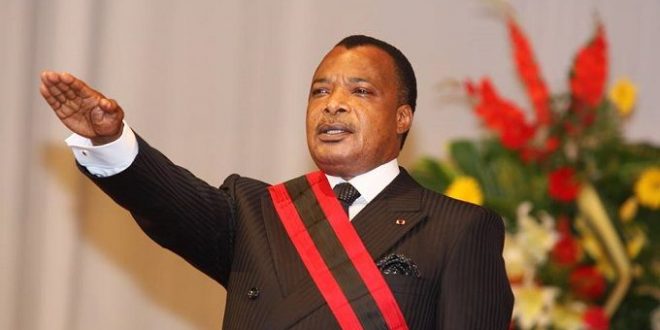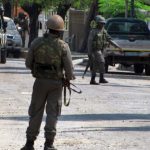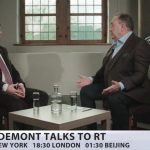Presidential election results in Congo look pessimistic for democracy in this country. There are all signs the dictatorship has been set up in Brazzaville with elements of government corruption, clamping down on opposition, and human rights violation. The incumbent president seeks to hold the power in the country. This desire spurs him on to contact and make agreements with other authoritarian leaders.
After 36 years in power, Denis Sassou Nguesso’s victory was crushing and expected.
At the end of the first round of the presidential election held on Sunday 21 March, Denis Sassou Nguesso(Congolese Marxist-leaning Party of Labour) was re-elected for a fourth term as the head of Congo with 88.57% of the vote, according to provisional results announced on Tuesday by Raymond Zephirin Mboulou, the Minister of Interior. The turnout was 67.55%.
Guy-Brice Parfait Kolélas (Congolese Movement for Democracy and Integral Development), who died of Covid-19 on Sunday night during a medical evacuation to France, had obtained 7.84% of the vote. He was considered the main opponent of the head of state.
The two strongest challengers remain in prison: former army chief Jean-Marie Michel Mokoko was arrested after challenging the incumbent in the last polls and charged with breaching state security; André Okombi Salissa (Initiative for Democracy in Congo) previously served in government, but then ran against Sassou-Nguesso and was detained in 2017 for possession of weapons. The arrest and detention of Mokoko and Salissa were politically motivated, rather than for legitimate crimes. The only two who could potentially challenge Sassou-Nguesso are Guy-Brice Parfait Kolélas, his former minister, and his ex-minister of finance Mathias Dzon. Dzon achieved his best score in his home town of Gamboma, where he got close to 45%.
Mathias Dzon, the former finance minister turned opponent, was credited with 1.90% of the vote. He had warned that he would probably not accept the official results on the grounds that the electoral commission is, according to him, “a partisan commission, which only foresees the victory of the candidate in power.”
According to the figures released by the Minister of Interior, the incumbent president came out on top in all 108 sub-prefectures of the country, with the exception of Kinkala and Louingui, in the Pool, and one district of Brazzaville (Makélékélé), all won by Guy-Brice Parfait Kolélas.
Sassou-Nguesso, ethnic Mboshi, who came to power in a coup in 1979, was affectionately referred to as “The Emperor” by Alassane Ouattara, Cote d’Ivoire’s president, in December, as he was sworn-in for a third term in office. Congo Brazzaville’s 2021 polls show consolidation of power for Sassou-Nguesso, rather than an opportunity for change. Till 1991 he aligned his country with the Soviet Union but after its fall was forced to introduce multi-party elections.
France was a long-standing supporter of Sassou-Nguesso. Paris provided significant aid to Brazzaville, and Total, the French oil multinational, has been active in the central African country since 1968. However, Sassou-Nguesso shows efforts to build stronger relationships with China and Russia since his 2016 re-election, and less public support from Paris. The Republic of Congo is sub-Saharan Africa’s third largest oil producer, thus Kremlin’s and Beijing’s interest lay in resources control and access. So, France is sitting back and neither publicly supports the Congolese strongman, nor makes critical statements.
Russia demonstrates efforts to deepen its presence in Congo. The Kremlin made the settlement of the Republic of the Congo’s debt to the Russian Federation under previously issued loans, and sent Russian military experts to this country. Congo borders with the CAR—where both official and “non-official” Russian military presence is currently well known thanks to broad-ranging evidence. So, Russia could employ the same pattern in Congo as it followed in the CAR to secure its economic interests in the country.
In turn, Russian Lukoil and TMK (Pipe Metallurgical Company) enter the Congolese oil producing market.Thousands of Congolese people attended Russian universities, and several government members who studied here and were recruited by intel services now are responsible for advising and development Congolese relations with Russia. Some of them got married and started families with Russians.
Denis Sassou Nguesso’s victory means no progress in Congolese democracy development and human rights improvement. Principal human rights concerns include restrictions on freedom of press, assembly, expression, and movement; poor prison conditions; ethnic discrimination and failure to protect asylum-seekers.
Unlikely that this election results will lead to large-scale violence in the same way as after elections in 2016. However, small incidents of violence, probably around suppression of opposition voters could happen.
In July, 2020 US federal prosecutors were probing his son, Denis Christel Sassou Nguesso, over alleged embezzlement of several million dollars from the publicly-owned National Society of Petroleum of Congo (SNPC). He seemingly stole over $50 million from the Congolese treasury by setting up a complex and opaque corporate structure in multiple countries. Six different European countries, the British Virgin Islands (BVI) and the American state of Delaware were all involved in an apparent money laundering scheme.




